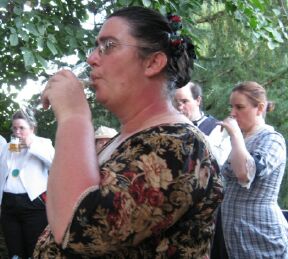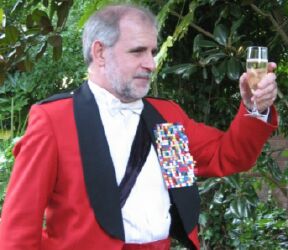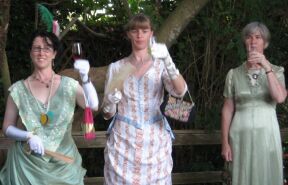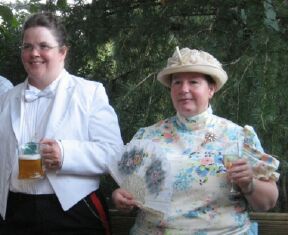The most common of Alf ceremonies, giving as it does the opportunity for almost unbridled speech-making, toasts occur at all social gatherings, wherever one might be, and under all imaginable conditions. However, for those unfamiliar with this most Imperial of traditions, the following is offered as a broad and general guide, designed to both Mystify and Confuse the casual observer, whilst still providing vital information regarding this deeply involved ceremonial occasion.
There are three points of vitally import to keep to the very fore of one's mind whilst performing the intricate peregrinations and linked responses required to make a succesful toast:
Traditionally toasts are made with a libation that is merely
 sipped, not quaffed as if one had been in the desert for weeks - even if that is, in
fact, the case. The immoderate bolting of peanuts or small sweets has been
performed successfully, if somewhat riskily, but is lacking in the necessary grace and style.
sipped, not quaffed as if one had been in the desert for weeks - even if that is, in
fact, the case. The immoderate bolting of peanuts or small sweets has been
performed successfully, if somewhat riskily, but is lacking in the necessary grace and style.During a toast the only person who should be in possession of their glass is the one actually proposing the toast (although they may choose to set it down), all others should be tabled to show due respect. Obviously there are some events where this prefect condition is just not practical, however, as often as possible one should endeavour to conform to this vital nicety.
By quite Ancient Tradition one must always toast with the left hand, as this is closer to the heart and, thereby, closer to God and the truth.

This most formal of ceremonies follows a set format for the first ten obligatory and two optional toasts (yes, there really are that many), all of which are designed to build the general sense of Pomp and Ceremony, along with helping to develop the unique mood of a Regimental Event to its fullest possible extent. As alluded to earlier, each toast is preceded by a preamble in the nature of a speech of varying length, complexity and degree of rambling across all manner of topics, whilst hopefully still coming back to the toast that is in hand as the ultimate goal of the exercise. This is speech designed to focus the attention of the audience, provide sufficient time to recharge one's glass if one has failled in point 1) above, or merely to Confuse, Confound and Concern the listeners.
The full and complete list of traditional toasts (including optionals) is:
- The Loyal Toast
- The Succession/The Royal Families
- The Royal Dogs (optional)
- The Empire
- The Dominion
- His Levity, The Arch Wizard of New Zealand
- The Regiment
In the event that a visiting Regiment is present, they are recognised here. If several are present then they are recognised individually in order of precedence.
- The Nursing Corps
- The Absence of the Surgeons (optional)
- Honoured Guests
- Absent Friends
The Final Toast, also referred to as the "Serious Toast", is of a genuinely serious nature and should be treated as such.
- Those Who Have Gone Before
The Ceremonial Process goes thusly, following a long-held tradition;
The most senior ranked member of the Regiment takes on
 the role of Primary Speaker, making the opening speech and than requesting, “Ladies and
Gentlemen, I would ask you to be upstanding and raise your glasses for the Loyal Toast.”
the role of Primary Speaker, making the opening speech and than requesting, “Ladies and
Gentlemen, I would ask you to be upstanding and raise your glasses for the Loyal Toast.”The Primary Speaker then calls upon the Adjutant, “Mr Adjutant, if you please”, who leads the assemblage in a stirring rendition of “God Save The Queen” - at the very least the first verse, more if he feels so inclined.
The assemblage remains standing for the following toast, also made by the Primary Speaker, then return to their seats in strict accordance to the Order of Seating whilst the Primary Speaker remains standing.
The Primary Speaker makes the next two toasts, allowing the assembled throng to take their seats between times.
The Primary Speaker then formally requests, “Mr Adjutant, I call on you to make the next toast.”
Mr Adjutant then takes the role of Secondary Speaker, making all remaining toasts but the last, requiring the assemblage to be seated between each (this may well prove to be the most exercise some have had in years). Following the toast to the Regiment, Mr Adjutant leads the Mess in “Soldiers of The Queen”.

Having completed the prescribed toasts, Mr Adjutant then calls for any toasts from the Mess - except to marshmallows or bread products. NB: Toasts may be made at any time during the evening, by anyone, but only after the formal toasting process has been completed. He may also call upon anyone to make a speech between his toasts on suitably obscure and uplifting topics
Having satistified himself that there are no further speeches to be made, Mr Adjutant then hands the role of Speaker back to the Primary Speaker with the request, “Mr Speaker, if I might request that you close the formal proceedings in the appropriate fashion”. The Primary Speaker then makes the final toast, “To Those Who Have Gone Before”.

In the normal course of events, some fifteen minutes after the Loyal Toast in the Mess, the Commanding Officer (as reminded by Mr Adjutant), or in his absence, Mr Adjutant himself, announces “Gentlemen, you may loosen your collars”. NB:Due to the nature of dining in general and Banqueting in particular, this period is extended to some thirty minutes at formal dining occasions. Of course a Gentleman cares less for comfort and more for propriety, so may well dispense with this sop to comfort.
Mr Adjutant may also call upon anyone to make a speech at any time during the evening on suitably obscure and uplifting topics, although the procedure at banquets is somewhat less arbitrary in nature, but only just. Please make your best effort, as this is all part of the Modern Victorian Experience. Do not be alarmed if your speech waffles and seems to take on a life of its own - that, too, is as much a tradition as the toasts themselves.